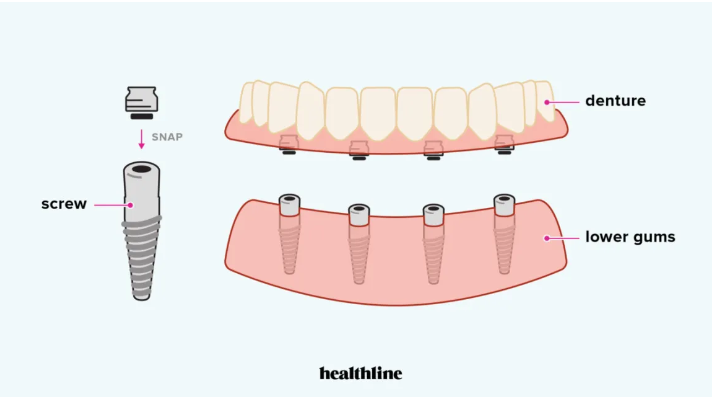
Dental implants are one of the most advanced and durable solutions in modern dentistry, offering a permanent and natural-looking alternative to traditional dentures and bridges. My name is David and I am an implant educator with a good knowledge of dental implant cost in Illinois as we have a lot of dental implant patients come to our office for complimentary second opinions to find about quality dental implants cost. Dental implants cost is one of the main factors for Illinois residents seeking dental care. Our office,Chicago Implant Studio, is a premier specialty provider of dental implants focusing on these procedures only. Dental implants cost typically depends on a range of factors, including the complexity of the dental implant procedure, the number of existing teeth, and whether a dental implant specialist performs the procedure or not.
In Illinois, the cost of dental implants in 2025 varies based on several factors, including the number of implants needed, the type of restoration, and any additional procedures required. On average, a single dental implant ranges from $3,000 to $6,000, including the implant placement, abutment, and crown. For multiple implants or full-mouth restorations, expenses can increase higher. It’s important to note that these figures are general estimates; consulting with a dental implant specialist will provide a more accurate cost tailored to your specific needs. Dental implants cost can vary greatly based on whether you require single implants or full mouth dental implants. While dental implants are an investment in your oral health, our office, Chicago Implant Studio, offers flexible payment options, making this life-changing, worthwhile investment more accessible. Below is the summary of monthly payments based on the general recommended treatments:
Single Tooth Dental Implant $95/Month (0% Finance / $0 Down)
Full Mouth Dental Implant $395/month (0% Finance / $0 Down)
The comprehensive dental treatment plan you receive at time of consultation will play a significant role in determining the entire cost of implants. In order to see if you are a candidate for dental implants and get the exact cost of implants based on your jaw bone density, you can book your initial complimentary bone scan consultation with an implant specialist by clicking here.
By understanding the costs and exploring options such as dental insurance or payment plans, you can make informed decisions about your dental care.
In This Article
Dental implants cost for Different Types of Implants
The average costs for dental implants can vary based on your specific needs. Here’s a breakdown of what to expect at Chicago Implant Studio:

Figure 1 Full mouth dental implants parts
Single Tooth Implants
You can expect to pay between $3,000 and $6,000 for a single dental implant in Illinois. This cost typically includes the implant post, the abutment (which connects the implant to the crown), and the custom-made crown. If additional procedures like bone grafting are needed, this can push the total higher. Despite the upfront cost, single-tooth implants are an excellent long-term investment as they offer a permanent solution. Below is the summary of monthly payments based on the general recommended treatments in our office :
Single Tooth Dental Implant $95/Month (0% Finance / $0 Down)
Multiple Implants or Full Mouth Implants (All-on-4)
If you’re missing most or all of your teeth, All-on-4 dental implants offer a comprehensive solution. In this procedure, four implants are used to support an entire arch of teeth. These implants may seem like a significant investment, but it provides a permanent and highly functional solution for patients who have lost multiple teeth.Below is the summary of monthly payments based on the general recommended treatments:
Full Mouth Dental Implant $395/month (0% Finance / $0 Down)
Implant-Supported Dentures
For patients who wear dentures but are looking for more stability, implant-supported dentures are an option. These are more secure than traditional dentures as they are anchored to dental implants, preventing them from shifting or slipping. Below is the summary of monthly payments based on the general recommended treatments:
Full Mouth Dental Implant $295/month (0% Finance / $0 Down)
Affordable Dental Implant Options
At Chicago Implant Studio, there are several ways to make dental implants more affordable:
Payment Plans and Financing Options
Many dental practices in Illinois offer payment plans to help patients spread out the cost of dental implants over time. These financing options can make it easier to fit the procedure into your budget. Some plans are interest-free for a set period, while others may have low-interest rates. It’s always a good idea to discuss financing with your dentist during the consultation.
Dental Insurance and Coverage
Unfortunately, most dental insurance plans do not fully cover the cost of dental implants. However, they may cover parts of the procedure, such as the crown, abutment, or bone grafting. Check with your insurance provider to see what is covered and whether supplemental insurance or health savings accounts can help reduce the out-of-pocket expense.
Discount Dental Plans
Some dental offices offer discount plans for patients who pay upfront or enroll in specific membership programs. These plans often reduce the overall cost of dental procedures, including implants. If you’re concerned about costs, inquire with your dentist about any discounts or promotions that may apply to your situation.
What Is a Dental Implant?
A dental implant is a modern solution to missing teeth, designed to mimic the natural tooth structure. It involves the surgical placement of a titanium post into the jawbone, which acts as an artificial root for the replacement tooth. Over time, the implant fuses with the bone through a process called osseointegration, providing a strong and stable foundation for crowns, bridges, or dentures. At Chicago Implant Studio, patients can receive the highest quality care with state-of-the-art materials, ensuring long-lasting and reliable results.
Benefits of Dental Implants
Choosing Chicago Implant Studio for your dental implant needs offers several key advantages:
- Durability: With proper care, dental implants can last a lifetime, making them a one-time investment for most patients.
- Natural Appearance: Implants are customized to match the color, shape, and size of your natural teeth, providing an aesthetic solution that looks and feels like real teeth.
- Bone Preservation: Implants help preserve jawbone density, preventing the bone deterioration that often occurs after tooth loss.
The Cost of Dental Implants in Illinois
Several factors can affect the total cost of dental implants in Illinois, and Chicago Implant Studio ensures transparency in pricing and treatment plans, helping patients budget effectively for their treatment.
Factors That Influence Dental Implant Costs
Several factors can affect the total cost of dental implants in Illinois, and understanding these can help you budget effectively for your treatment.
Type of Implant and Materials Used
The type of implant and the materials used can significantly impact the price. Titanium is the most commonly used material for implants due to its strength and ability to fuse with bone. However, zirconia implants, which offer a more aesthetic, tooth-colored alternative, tend to be more expensive. Additionally, the type of restoration—whether you’re getting a single crown, an implant-supported bridge, or a full-arch prosthesis—will affect the total cost.
Number of Implants Needed
If you’re only missing one tooth, the cost will be significantly lower than if you’re replacing an entire row or mouthful of teeth. Multiple implants increase the complexity of the procedure, and full-mouth restorations often require several implants to support an arch of teeth. Each additional implant adds to the overall cost.
Additional Procedures (Bone Grafts, Extractions, etc.)
In some cases, patients may require additional procedures to prepare for dental implants. Common preparatory treatments include:
- Bone grafting: This procedure is necessary if your jawbone lacks sufficient density to support an implant. It adds to the overall cost but ensures the implant has a stable foundation.
- Tooth extractions: If you have damaged or decayed teeth that need to be removed before the implants can be placed, this will also add to the total cost.
Geographic Location and Expertise of the Dentist
The cost of dental implants can vary depending on where you live in Illinois. Urban areas like Chicago tend to have higher costs due to higher overhead for dental practices. Additionally, the expertise and experience of the dentist or oral surgeon performing the procedure play a role in pricing. Specialists who have extensive experience in dental implantology may charge more, but this can often translate to a higher success rate and better outcomes.
How Long Do Dental Implants Last?
One of the biggest advantages of dental implants is their potential longevity. With proper care, dental implants can last 20 years or longer, and in some cases, they may last a lifetime. The durability of implants makes them a cost-effective option in the long run, especially when compared to other tooth replacement methods like dentures, which need to be replaced every few years.
Factors That Influence Implant Longevity
- Oral hygiene: Regular brushing and flossing are essential to keeping your implants and surrounding gum tissue healthy.
- Lifestyle: Smoking and poor diet can increase the risk of implant failure.
- Regular dental check-ups: Routine visits to the dentist will help ensure that your implants are in good condition.
Additional Costs Associated with Dental Implants
After receiving dental implants, maintaining good oral hygiene is crucial to the longevity of the implant. While this doesn’t add significantly to the cost, you should factor in the expense of regular dental check-ups and cleanings. In the first few months after the procedure, your dentist may recommend more frequent visits to monitor healing and ensure the implant is integrating properly with your jawbone.
Follow-Up Visits and Adjustments
Follow-up visits are often necessary to check the progress of your dental implants and make any necessary adjustments. While many dentists include these visits in the overall cost of the implant procedure, some may charge extra for additional appointments, particularly if complications arise.
Why Dental Implants Are Worth the Investment
Dental implants may have a higher initial cost compared to other tooth replacement options, but they offer superior long-term benefits. Here’s why dental implants are considered worth the investment:
- Improved functionality: Implants restore full chewing power, allowing you to eat all types of foods without discomfort.
- Enhanced aesthetics: Dental implants look and feel like natural teeth, giving you confidence in your smile.
- Longevity: Unlike bridges or dentures, which often need to be replaced, dental implants can last a lifetime with proper care.
- Jawbone preservation: Implants help maintain jawbone density, preventing the sunken appearance that often comes with tooth loss.
While the cost may seem steep, the lifetime benefits of dental implants make them a cost-effective solution for tooth replacement.
Dental Implants vs. Traditional Tooth Replacement Methods: Cost Comparison
When considering dental implants, it’s essential to weigh the long-term costs against other tooth replacement options. While dental implants have a higher upfront cost, they often prove to be more cost-effective in the long run due to their durability and low maintenance needs.
Dentures: Lower Initial Cost, Higher Long-Term Expense
Dentures are the most affordable option for replacing missing teeth, with prices ranging from $2000 to$3,000 per arch, depending on the materials used. However, dentures require regular maintenance and replacement every 5 years. Additionally, many denture wearers need to purchase adhesives and cleaning solutions, which add to the ongoing cost.
Dental Bridges: Moderate Cost, Moderate Longevity
Dental bridges typically cost between $1,500 and $5,000, depending on the number of teeth being replaced. While bridges are more durable than dentures, they still need to be replaced eventually, adding to the overall expense. Additionally, the need to alter adjacent teeth can lead to further dental work down the line.
Dental Implants: Higher Upfront Cost, Long-Term Savings
Dental implants have a higher initial cost, but they are designed to last a lifetime with proper care. This makes them a more cost-effective solution over the long term, especially when compared to dentures or bridges, which require periodic replacement. The durability, functionality, and aesthetic benefits of implants often outweigh the higher upfront cost for many patients.
The Dental Implant Process: Step-by-Step Overview
To fully understand the cost of dental implants, it’s essential to comprehend the stages of the dental implant process. This is a multi-step procedure that extends over several months, requiring careful planning and expert execution to ensure long-term success. Each step may affect the overall cost, especially if complications arise or additional treatments are required.
Step 1: Initial Consultation and Examination
The first step in the dental implant process is an initial consultation with your dentist or oral surgeon. During this visit, the dentist will conduct a thorough examination, which typically includes:
- Dental X-rays: To assess the condition of your jawbone and determine whether it’s strong enough to support an implant.
- 3D imaging: In some cases, 3D imaging may be used to create a detailed map of your mouth, helping the dentist plan the implant placement with greater precision.
- Dental impressions: These impressions are used to create a model of your teeth and gums, which will assist in designing your custom-made crown, bridge, or denture.
During the consultation, your dentist will also review your medical history to determine if you’re a good candidate for dental implants. Certain conditions, such as uncontrolled diabetes or severe gum disease, may affect the healing process and success rate of the implants.
Step 2: Pre-Implant Procedures (If Needed)
If you have insufficient jawbone density or gum tissue, your dentist may recommend additional procedures to prepare your mouth for the implant. These procedures include:
- Bone Grafting: If the jawbone has deteriorated due to prolonged tooth loss, a bone graft may be necessary to restore enough bone volume to support the implant. Bone grafts can be taken from another part of your body or provided as synthetic bone material.
- Sinus Lift: For patients receiving implants in the upper jaw, a sinus lift may be required if the sinus cavity is too close to the jawbone or if there is insufficient bone height. This procedure involves raising the sinus membrane and placing a bone graft to create enough space for the implant.
- Tooth Extractions: If you have a damaged or decayed tooth that cannot be saved, it will need to be extracted before placing the implant. In some cases, the implant can be placed immediately after the extraction, but other times, the dentist will wait for the site to heal.
Each of these procedures adds to the total cost of the dental implant treatment but ensures that the implants have a solid foundation for long-term success.
Step 3: Implant Placement Surgery
Once your mouth is prepared, the implant placement surgery is scheduled. This is the stage where the titanium implant post is surgically inserted into the jawbone. The procedure is typically performed under local anesthesia, although sedation or general anesthesia may be offered for patients who are anxious or require more extensive surgery.
The surgery involves the following steps:
- Incision: The dentist will make a small incision in the gum to expose the jawbone.
- Drilling: A special drill is used to create a space in the jawbone for the implant.
- Implant Placement: The titanium implant is inserted into the prepared space.
- Stitching: The gum is stitched back together, covering the implant. Over time, the implant will fuse with the jawbone in a process called osseointegration.
Step 4: Healing and Osseointegration
After the implant is placed, the healing process begins. During this period, the implant will integrate with the bone, providing a stable foundation for the artificial tooth. This process, called osseointegration, typically takes 3 to 6 months, depending on the patient’s bone density and overall health.
During this healing period, you may be fitted with a temporary crown or denture to maintain your appearance and functionality. It’s essential to follow your dentist’s post-operative instructions, including maintaining good oral hygiene and avoiding certain foods that could disturb the implant site.
Step 5: Abutment Placement
Once the implant has fully integrated with the jawbone, the next step is to attach the abutment. The abutment is a small connector that sits above the gum line and attaches to the implant. It serves as the base for the final restoration, whether it’s a crown, bridge, or denture.
This procedure involves reopening the gum to expose the implant, attaching the abutment, and then stitching the gum tissue around it. In some cases, the abutment can be placed at the same time as the implant, but in other cases, it’s done as a separate procedure after the implant has healed.
Step 6: Placement of the Final Restoration
The final step in the dental implant process is placing the custom-made crown, bridge, or denture onto the abutment. This restoration is designed to blend seamlessly with your natural teeth, both in appearance and function.
The restoration is usually made from materials like porcelain or ceramic, which mimic the translucency and color of natural teeth. Your dentist will ensure that the restoration fits perfectly and feels comfortable in your mouth.
Once the final restoration is in place, the dental implant process is complete. You’ll have a fully functional, natural-looking tooth that can last a lifetime with proper care.
What to Expect After Dental Implant Surgery
Understanding the recovery process after dental implant surgery can help you manage expectations and ensure a smooth healing experience. While dental implants have a high success rate, proper post-operative care is essential for achieving the best possible results.
Immediate Post-Surgery Recovery
Immediately after the implant surgery, you may experience some discomfort, swelling, and minor bleeding at the surgical site. These symptoms are normal and can be managed with:
- Over-the-counter pain medications: Ibuprofen or acetaminophen can help alleviate pain and reduce swelling.
- Cold compresses: Applying a cold compress to the outside of your face can help reduce swelling and discomfort.
- Soft foods: Stick to soft, nutrient-rich foods like yogurt, mashed potatoes, and smoothies during the first few days to avoid putting pressure on the implant site.
Long-Term Care for Dental Implants
Taking care of your dental implants is similar to caring for your natural teeth. Maintaining good oral hygiene is crucial to prevent infections and ensure the longevity of the implant.
- Brushing and Flossing: Brush and floss your implants just as you would your natural teeth. Be sure to use a soft-bristled toothbrush and a non-abrasive toothpaste to avoid damaging the restoration.
- Regular Dental Check-Ups: Continue visiting your dentist for routine check-ups and cleanings. Your dentist will monitor the health of your implants and the surrounding gum tissue to ensure everything remains in good condition.
In the long term, your implants will feel and function like natural teeth. However, it’s essential to avoid habits that could jeopardize the implant’s success, such as smoking or chewing on hard objects like ice or pens.
Are You a Good Candidate for Dental Implants?
Not everyone is a suitable candidate for dental implants. Several factors influence whether implants are the best option for you, and understanding these factors can help you and your dentist make an informed decision.
Key Factors to Consider
- Jawbone Density: Successful dental implants require sufficient jawbone density to anchor the implant. If your jawbone has deteriorated due to prolonged tooth loss, you may need a bone graft to build up enough bone volume for the implant.
- Overall Health: Certain health conditions can affect your ability to undergo implant surgery. For example, uncontrolled diabetes, heart conditions, or autoimmune disorders may complicate healing. It’s important to discuss your medical history with your dentist before moving forward with implants.
- Gum Health: Healthy gums are essential for the success of dental implants. If you have gum disease, it will need to be treated before implants can be placed.
- Smoking: Smoking can impede the healing process and increase the risk of implant failure. If you smoke, you may need to quit or significantly reduce your smoking habits before undergoing dental implant surgery.
Age Considerations
Dental implants are suitable for adults of all ages, as long as the jawbone is fully developed. However, for younger patients, it’s essential to ensure that their jaw has reached its full size before considering implants. For older adults, dental implants can be an excellent solution for tooth loss, as long as they meet the necessary health requirements.
The Psychological Benefits of Dental Implants
While the physical benefits of dental implants are well-documented, the psychological and emotional benefits should not be overlooked. Tooth loss can have a profound impact on a person’s self-esteem and overall quality of life. Dental implants can help restore confidence, improve social interactions, and enhance mental well-being.
Improved Self-Esteem
Many people feel self-conscious about missing teeth, which can affect their ability to smile, speak, and interact with others confidently. Dental implants provide a natural-looking solution that restores your smile and boosts self-esteem. This newfound confidence can have a ripple effect, improving both personal and professional relationships.
Enhanced Quality of Life
Tooth loss can make it difficult to eat certain foods, affecting your diet and nutrition. Dental implants restore full chewing function, allowing you to enjoy a wide range of foods without discomfort. This can lead to better overall health and a more satisfying eating experience.
Reduced Anxiety About Oral Health
For patients who have struggled with tooth decay, gum disease, or frequent dental issues, dental implants offer peace of mind. Unlike natural teeth, implants are not susceptible to decay, and with proper care, they can last a lifetime. This reduces anxiety about future dental problems and the need for ongoing treatments.
Conclusion
The cost of dental implants in Illinois in 2025 can vary widely depending on several factors, including the type of implant, the number of implants needed, and any additional procedures required. Whether you’re looking for a single tooth replacement or a full-mouth restoration, understanding the costs and financing options available will help you make an informed decision.
Ultimately, dental implants are an investment in your long-term oral health, function, and appearance. If you’re considering dental implants, consult with a qualified dentist in Illinois to discuss your specific needs and options. With the right information and planning, you can restore your smile and improve your quality of life.






